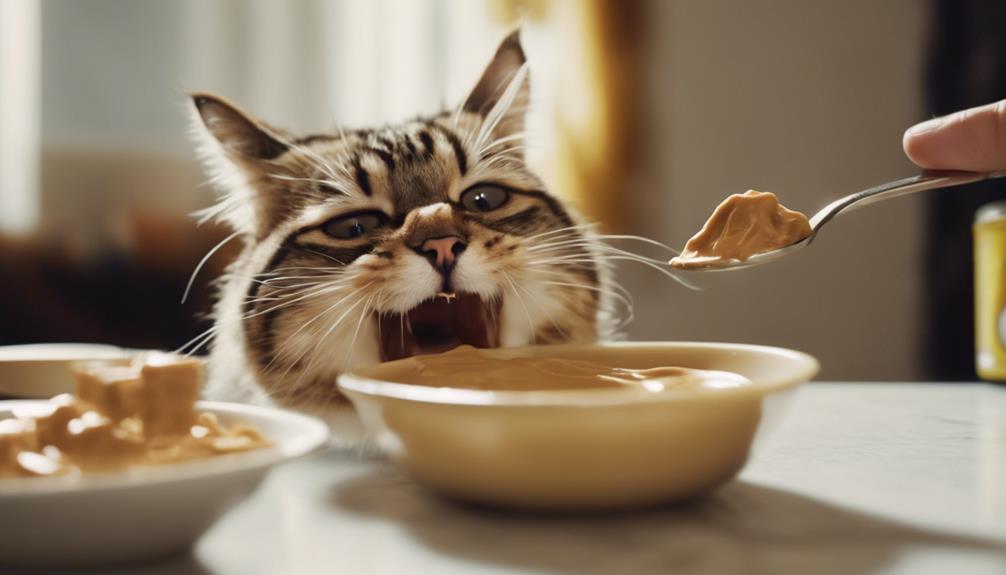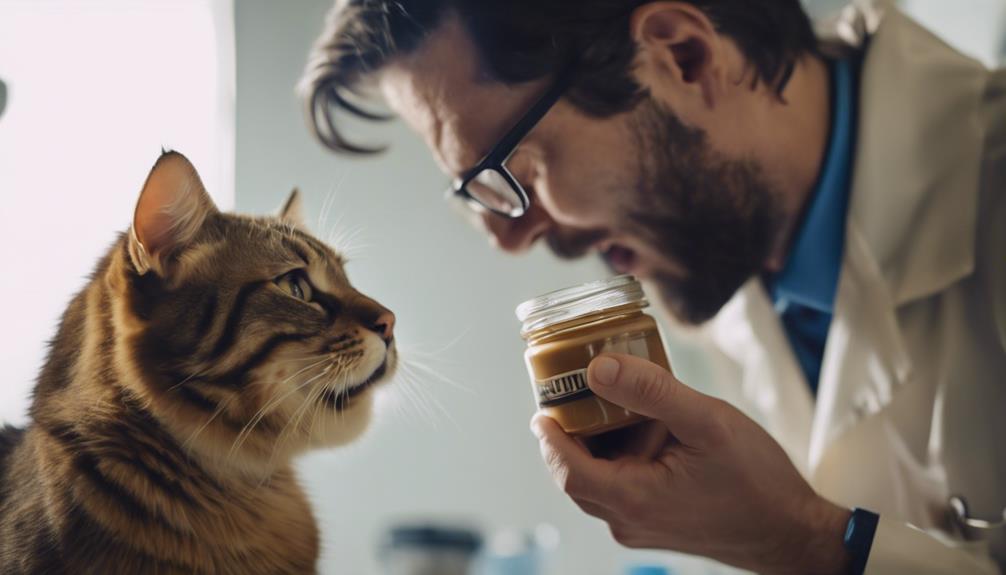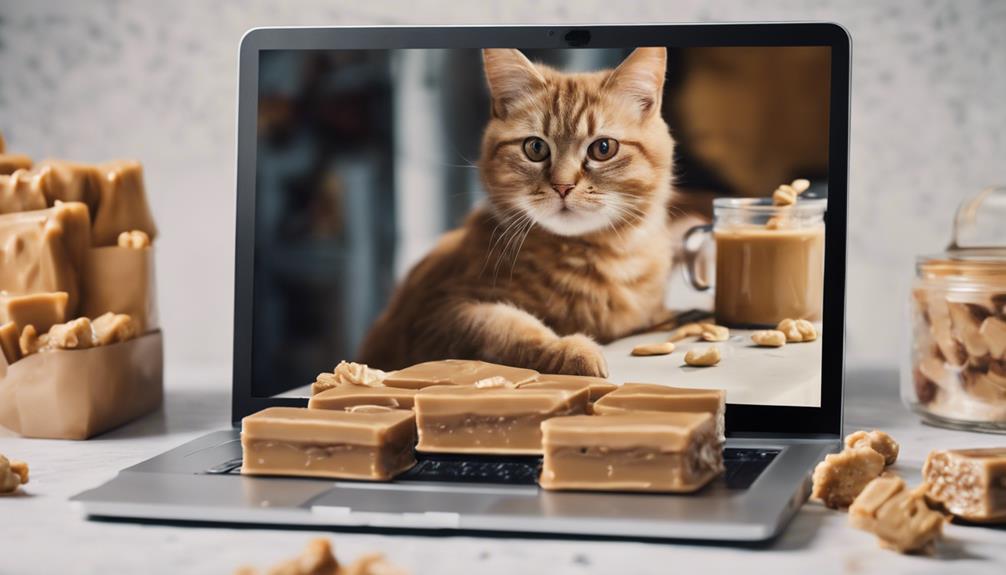Within the realm of feline dietary choices, the question of whether peanut butter is a suitable treat for cats surfaces as a topic of intrigue and contemplation. The complexities surrounding this widely debated issue beckon a closer examination, delving into the nutritional impact, potential hazards, and recommended feeding practices associated with offering this beloved spread to our feline companions.
As pet owners navigate the landscape of feline nutrition, understanding the multifaceted relationship between cats and peanut butter unveils a web of considerations that extend beyond mere taste preferences. What lies at the core of this intricate debate may surprise even the most discerning cat enthusiasts.
Key Takeaways
- Peanut butter offers fats and protein but can lead to weight gain if not given in moderation.
- Check for xylitol in ingredients to avoid toxicity risks for cats.
- Supervise cats to prevent choking hazards from the sticky texture of peanut butter.
- Consider cats' specific dietary needs and potential allergies before offering peanut butter.
Nutritional Value of Peanut Butter for Cats
What nutritional benefits does peanut butter offer to cats, considering their unique dietary requirements as obligate carnivores?
While cats primarily thrive on meat-based diets rich in protein and taurine, peanut butter can provide some advantages when used cautiously.
Peanut butter contains healthy fats, protein, and some vitamins that can supplement a cat's diet.
The fats in peanut butter may help with skin and coat health, and the protein content can aid in muscle maintenance.
However, moderation is key due to the high-fat content, as excessive consumption can lead to weight gain and potential health issues.
When used sparingly as an occasional treat, peanut butter can offer a tasty addition to a cat's diet, but should not replace essential nutrients from meat sources.
Potential Risks of Feeding Cats Peanut Butter
Feeding cats peanut butter poses potential risks that stem from the product's composition and cats' unique dietary needs. Peanut butter is high in fats and sugars, which can lead to weight gain and digestive issues in cats, who require a diet rich in protein.
Moreover, some peanut butter brands contain xylitol, a sweetener toxic to cats. The sticky texture of peanut butter can also pose a choking hazard or stick to the roof of a cat's mouth, causing discomfort. Additionally, excessive peanut butter consumption could potentially lead to pancreatitis due to its high-fat content.
Therefore, it is essential to be cautious when considering feeding cats peanut butter to avoid any adverse health effects.
Proper Ways to Feed Cats Peanut Butter

Considering the potential risks associated with feeding cats peanut butter, it is important to understand the proper ways to offer this treat to feline companions. When feeding cats peanut butter, ensure it is given in moderation as an occasional treat rather than a regular part of their diet. It is crucial to choose natural peanut butter without added sugars or xylitol, a harmful sweetener for cats. Always supervise your cat while they enjoy peanut butter to prevent choking hazards. Below is a guide to safe feeding practices for cats and peanut butter:
| Safe Feeding Practices for Cats and Peanut Butter | Description |
|---|---|
| Offer in small amounts | Prevents overconsumption |
| Check for additives | Avoid harmful ingredients |
| Watch for any allergic reactions | Monitor for adverse effects |
Considerations for Cats Consuming Peanut Butter
When contemplating the inclusion of peanut butter in a cat's diet, it is imperative to assess the potential implications on their nutritional balance. While peanut butter can offer a source of protein and healthy fats, it is crucial to note that cats have specific dietary requirements as obligate carnivores.
Excessive consumption of peanut butter may lead to an imbalance in their diet, especially if it replaces essential nutrients such as taurine found in meat. Additionally, some cats may have allergies to peanuts, causing adverse reactions.
Moderation and consideration of a cat's overall diet are key factors to keep in mind when offering peanut butter as an occasional treat. Prioritizing their health and well-being remains paramount when introducing new food items.
Expert Insights on Feline Nutrition and Treats

What expertise do professionals offer regarding feline nutrition and treats? Feline nutritionists emphasize the importance of a balanced diet for cats to thrive. They recommend diets rich in protein, essential amino acids like taurine, and moderate levels of dietary fat. Treats should complement a cat's diet without compromising its nutritional needs. Here is a breakdown of key insights from feline nutrition experts:
| Nutrition | Treats |
|---|---|
| High protein diet | Limited treats intake |
| Essential amino acids | Natural ingredient treats |
| Moderate dietary fat | Avoid sugary treats |
| Adequate water intake | Monitor treat portion size |
| Balanced nutrients | Choose treats with added benefits |
Importance of Reviewing Terms of Service
Understanding the terms of service of any platform is fundamental for users to navigate the legal framework that governs their rights and obligations.
- Regularly reviewing Terms of Service is crucial for staying informed.
- Changes in Terms of Service may impact user rights and responsibilities.
- It is essential to comprehend the implications of any updated Terms of Service.
- Being aware of and accepting updated Terms of Service indicates agreement with the new terms.
Enhancing Website Engagement With Newsletters

Enhancing website engagement through newsletters is a strategic method to deliver valuable information and updates to users. Newsletters serve as a direct communication channel, offering subscribers exclusive insights, promotions, and relevant tips. By subscribing, users establish a more intimate connection with the website, receiving tailored content straight to their inbox.
The process of signing up for newsletters typically involves sharing basic personal details, ensuring that the content received is customized to individual preferences. Users retain control over their subscription preferences through account settings, allowing them to manage the frequency and type of information they wish to receive.
Embracing newsletters can enhance user experience, keeping them informed and engaged with the website's offerings.
Conclusion
In conclusion, the debate over whether peanut butter is suitable for cats is multifaceted and complex.
While peanut butter can offer certain nutritional benefits, it also poses potential risks to feline health.
It is crucial for cat owners to consider the proper ways to feed their pets peanut butter and consult with experts on feline nutrition.
Ultimately, an informed and cautious approach is key to ensuring the well-being of our beloved feline companions in the face of tempting treats.




